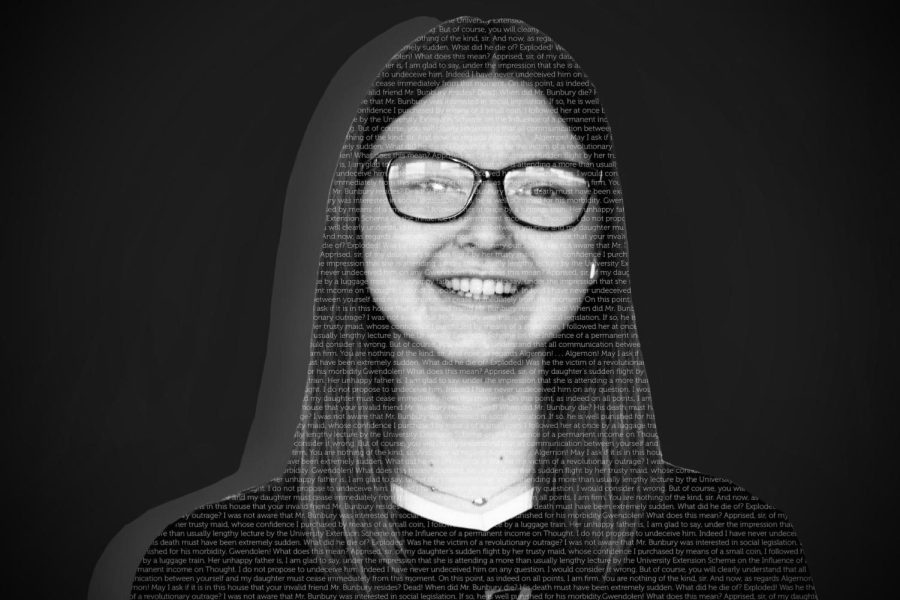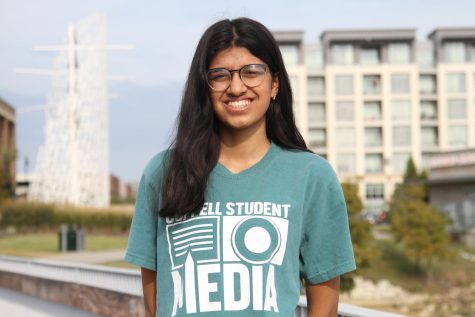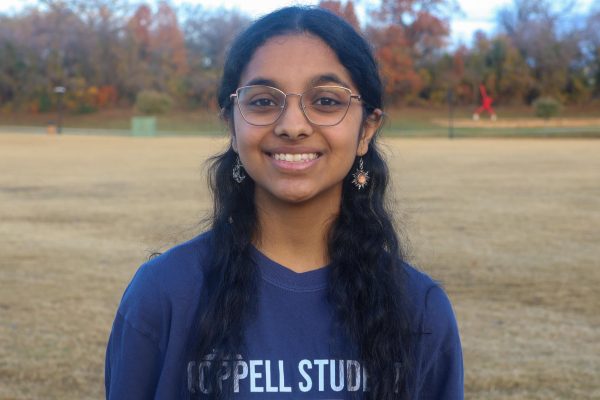Howe employing words as a double-edged sword
Coppell High School junior Elise Howe is a member of the CHS Cowboy Theatre Company and Coppell Debate. Whether it be through arguments or scripts such as “The Importance of Being Earnest,” Howe uses words to guide her through her co-curricular activities.
May 10, 2023
The spotlight envelopes Coppell High School junior Elise Howe as she steps on the stage, bathing her in a warm wash of radiance. On a different day, the room falls silent, all eyes turned to her standing at the podium. Her voice is razor sharp with a mind as quick as lightning.
The common thread between these seemingly contrasting activities: the power of words.
“In theater you’re directly speaking to a large audience, and you’re trying to use your words, your physical choices and your face to clearly communicate a story that will make the audience feel something,” Howe said. “In debate, you’re doing the same thing, but people don’t realize how much you have to do it. In debate, you only have one judge, so your audience is a lot smaller. Your judge can absolutely be impacted by you telling stories. It has to do with putting yourself into the speech in the same way you put yourself into a character in theater.”
Although Howe’s parents encouraged her to join theater in second grade, it was not until she assumed the role of prop master for Coppell Theater’s production “SpongeBob: The Musical” that she truly found her calling. Amidst the challenging task of creating close to 100 props in a matter of months, Howe confronted a significant amount of stress.
“Even though this was not a great experience for me, I remember loving to watch what was happening on stage,” Howe said. “I felt so lucky to get to stand backstage in the wings and just watch ‘I’m not a loser’ by Tyler Schweitzer every single night. It was so much fun seeing that, getting that same pleasure even when I was super stressed and having a community of people who were supporting me through that stressful time. Building that community and getting that joy out of watching what was on stage, that was when I knew that even if I had one bad experience in theater, I would love it no matter what.”
Although Howe boasts a decade-long career in theater, it was not until this year that she made her first foray onto the high school stage, portraying the formidable Lady Bracknell in the UIL One-Act Play, “The Importance of Being Earnest.”
“My most recent character, Lady Bracknell, was someone I did not think that I was because she’s an old lady. She is the definition of a British aristocrat, very wealthy, very powerful, a lot of status. As a 16-year-old, I was like, ‘this isn’t me’,” Howe said. “The more I looked at the role and the person under all of this glamour, I began to see myself. This is a woman who has confidence and is trying to protect her family, those are things that I can relate to and those are the things that I tried to highlight with my acting. In the same way as she is trying to protect her family, I protect mine and that showed in my acting.”
From an outside perspective, the process of preparing for a theater role may seem to revolve primarily around memorizing and delivering lines with precision. However, for Howe, the foundation for a successful performance begins not with the script, but rather gaining a deeper understanding of the character at hand, a technique that CHS theater director Lisa Stucker refers to as tablework.
Howe’s biggest strength in theater does not come from her ability to bring a character to life or technical production. Rather, it is her ability to embrace the constant evolution of her craft, embracing constructive criticism.
“She internalizes notes for improvement, so when we get feedback from a judge, a clinician or just in rehearsal and I’m giving her stuff to work on, she will take that and go home and do the work herself,” Stucker said. “The next time I see her on stage, she is actively applying the notes, which seems straightforward but in practice, it’s hard to do, especially for younger actors. That’s the kind of thing that takes a lot of practice with self reflection in order to be able to take the note and then apply it almost immediately and she gives each attempt 100%.”
In Howe’s eyes, theater and debate are connected by a common thread of linguistic influence, bearing more similarities than one might initially perceive. When constructing a debate argument, a speaker must delve into extensive research to explore all facets of the issue at hand, just as in theater, contextual research plays a pivotal role in bringing a character to life on stage.
“In theater you’re getting up on stage because you want to tell a different story,” Howe said. “In ‘Mamma Mia!’, we’re telling the story of Sophie, a young Greek girl who’s experiencing love. In ‘The Importance of Being Earnest,’ we were telling the story of British aristocracy and we were really mocking it. But every different story that you’re telling is valuable because you’re learning more about that time period, about that place, about those people. In the same way you do research for debate, you have to do research for theater, you have to look into the context that the play was written in, you have to think how would my character react to all of these different things happening in this world?”
While Howe’s journey in theater spans far and wide, her entry into the realm of debate began relatively late, during her virtual freshman year. Undeterred by the obstacles of navigating weekly online debate tournaments, Howe dedicated herself to attending practices and even participating in international competitions from the comfort of her own room.
A seemingly unremarkable Wednesday practice proved to be the turning point in which Howe discovered a newfound passion.
“One of the current seniors, Hunniya Ahmad, who is now our Lincoln-Douglas captain, started talking about what you could do in debate and all the different positions,” Howe said. “She also talked about why she enjoyed doing debate and hearing her story is what empowered me to think ‘I can do that,’ I can become a great debater and I can get a lot out of it. But that is really when I decided I’m going to stay with this for all four years of high school, and I’m going to love it.”
Inspired by Ahmad’s tale of unwavering support and encouragement towards fellow debaters, Howe was inspired to follow in her footsteps. With the onset of her sophomore year, Howe assumed the same role that Ahmad once held for her, providing guidance and motivation to her peers.
“Elise is one of the people who also helps the novices at the ninth grade center out a lot,” sophomore Navya Singh said. “She’s really supportive and she knows how to break things down to be more easy to comprehend for someone who’s just starting out debate. Last year I did debate, but this is my first year doing Lincoln-Douglas. She was really really helpful and supportive and here’s how you make this kind of argument, here’s a different website, a different way to research something. She’s really good at offering resources and she’s just really good at breaking things down. She’s really articulate and knows how to explain them in a way that makes sense, instead of some really complicated way.”
Lincoln-Douglas debate, by its very nature, is regarded as an individual pursuit, with debaters preparing and presenting arguments without the support of a team. However, this has not held Howe back from forging profound and lasting connections with her fellow debaters.
“I have a whole team of people and we are building cases together,” Howe said. “That research and that knowledge on how to use our resources that our school provides us with and how to look at policies from so many different perspectives is very valuable and I think doing that with a community of people has been a great experience for me.”
Follow Manasa (@Manasa_Mohan_7) and @CHSCampusNews on Twitter











